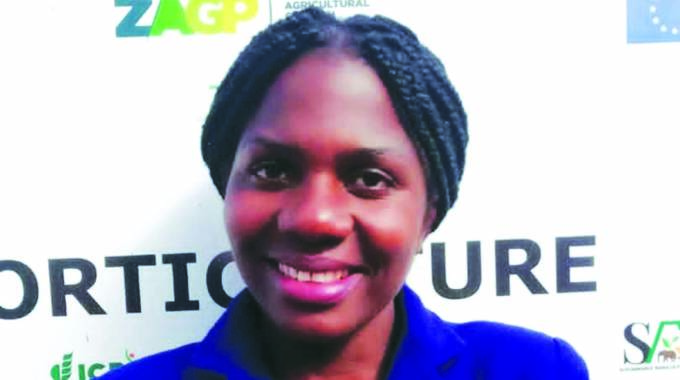
The Sunday Mail

Munya Simango
Correspondent
Rumbidzai Bodo (36), a final year student at Chibero Agricultural College, is full of enthusiasm and optimism as she looks forward to fully utilising her newly acquired skills and knowledge after graduating. She is one of the 78 students at the college who will this year graduate with a Diploma in Agriculture.
“I want to venture into farming after graduating because I am confident that I will be good at it. I do not have land, but I will try to get a small piece of land and apply exactly what I learned at the Chibero Agricultural Centre of Excellence,” she says.
However, the former general hand at the Coffee Research Institute in Chipinge, also recalls that her first-year experiences at the college were tough.
“When I enrolled here in 2018 the college’s training facilities were not in a good working condition, learning was difficult, we used to water the horticulture garden using buckets and we could not take practical lessons for most of the subjects.”
In response to this, and to establish a sustainable, practical, relevant, and modern education system, the Ministry of Lands, Agriculture, Fisheries, Water, and Rural Resettlement in partnership with the European Union (EU), funded Zimbabwe Agriculture Knowledge and Innovation Systems (ZAKIS) project, established Agricultural Centres of Excellence at Chibero Agricultural College and Matopos Research Institute.
As focal points of the ZAKIS intervention, the centres are tasked with demonstrating best practices in crop and livestock production while providing research and knowledge sharing services to students and farmers. They are complemented by ZimAgriHub, a virtual centre of excellence, and the District Agricultural Centres of Excellence, which are located at Matobo, Chegutu, Insiza and Mhondoro-Ngezi.
Commenting on the development, Chibero Agricultural Centre of Excellence coordinator and college lecturer, Mr Clemence Tarubona said; “This college was established to teach practical agriculture, so most of the training that is given to students must be hands-on.
“However, the institution had for some time been unable to provide adequate practical training because our facilities were old, and the infrastructure was dilapidated. We did not have the necessary tools and facilities to teach effective practical lessons and so we would teach theory most of the time.”
He said that with the help of the EU funded ZAKIS project, the college has managed to establish a centre of excellence, that boasts of refurbished infrastructure that includes fishponds, animal housing and solar-driven boreholes.
“The project also developed new facilities like the drip irrigation system and the five-hectare demonstration plot. This has had a big impact on the quality of education that we are now providing. It has made training and learning easier for both students and lecturers. Therefore, since its establishment, the centre of excellence has allowed us to deliver on our original mandate of hands-on practical training.” said Mr Tarubona.
He added that since 2019, the college has used the centre’s facilities to train three intakes, making 195 students drawn from across the country.
One of the ZAKIS’ key objectives is to contribute to establishing a modern, market-oriented agriculture education system that provides hands-on experience.
Rumbidzai said, “We now have practical lessons in most subjects and in horticulture we learned how to set up a drip irrigation system. We also had hands-on training in crop management, that is, the spraying, irrigation and fertiliser application for peas, tomatoes, beetroot, carrots, cabbages, and spinach. In the past, we could not do this because of water shortages.
“The renovated fishponds also allowed us to get practical training on fish production from stoking, feeding, disease management and harvesting. We are learning by seeing and doing.”
“In the past, we struggled to make students understand what we were trying to teach. But the centre of excellence allows us to deliver lectures in a practical way; we demonstrate to the students how things are done, and they learn by observing and following the example.
“This makes teaching more effective and the students’ understanding of the subject matter and the concepts much easier,” Mr Tarubona said.
He added that ZAKIS also facilitated a new approach to agriculture education through the introduction of entrepreneurial training.
“This equips students with the right attitude, business knowledge and farming skills to become agriculture entrepreneurs.”
“I was always interested in agriculture, and I also realised that farming as a business is very profitable. I feel well equipped with the knowledge and I am sure I will do better when I get the practical experience as I apply my knowledge.
“I have started growing crops in the garden at home. Last year I grew onions which my family consumed from August to January.
“I am focused on getting land to start my projects so that I can improve my family’s income through commercial horticulture,” Rumbidzai said.
ZAKIS is part of the EU funded Zimbabwe Agricultural Growth Programme (ZAGP), a response to the challenges within the country’s agriculture sector through a €40 million financial support package from the EU.
ZAGP seeks to contribute to the development of a diversified and efficient agriculture sector that promotes inclusive green economic growth.
Its focus is on increasing profitability, building the capacity of farmers, service institutions, and the private sector through increased investment, institutional reforms, and policy alignment.
ZAKIS specifically seeks to improve Zimbabwe’s agriculture sector by enhancing the dissemination of agricultural knowledge and stimulating innovation through strengthening the working links among agricultural research, education, and extension services.
The project is implemented by a consortium of local and international agricultural specialist NGOs, comprising Welthungerhilfe (WHH), International Crops Research Institute for the Semi-Arid Tropics (ICRISAT), Community Technology Development Organisation (CTDO), and Sustainable Agriculture Technology (SAT).



